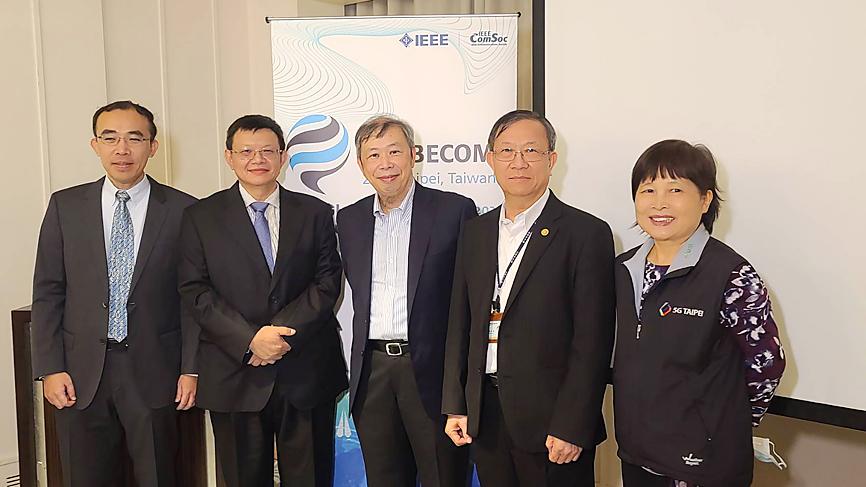The Institute of Electrical and Electronic Engineers (IEEE) Global Communications Conference (GLOBECOM) began at the Taipei International Convention Center yesterday with the theme “Communications for Human and Machine Intelligence,” as many of the 73 participating companies focused on 5G, artificial intelligence, big data, edge computing, the Internet of Things and e-medicine.
The four-day GLOBECOM is the flagship event of the IEEE, the largest professional electronics association in the world, and this year’s chairman, Chunghwa Telecom Co (中華電信) chief executive of mobile services Tu Yuan-kuang (涂元光), marked the significance of the occasion at a news conference in Taipei on Monday.
“The holding of GLOBECOM 2020 in Taipei is important for Taiwan,” Tu said. “It’s time to shake off the ‘contract manufacturer’ label with cutting-edge research.”

Photo: CNA
“The ability for 5G technology to dramatically increase the amount of data we can transfer will open up brand new possibilities for applications,” Department of Industrial Technology Director-General Chiou Chyou-huey (邱求慧) said at the conference yesterday.
By working with the industry and nonprofit organizations, the department has developed more than 650 potential applications, some of which are being showcased at the department’s booth at the conference, Chiou said.
One application is a remote monitoring system conveying real-time data from a factory to off-site professionals, he said.
“The workers on the floor might not be able to tell anything is wrong, but off-site engineers can immediately detect problems,” Chiou said. “This would not have been possible using 4G because of the volume of data and the time lag.”
Hon Hai Precision Industry Co (鴻海精密) is participating at GLOBECOM for the first time, presenting a live demonstration of its 5G open radio access network solutions, with low latency and download speeds of 1 gigabyte per second.
Cisco Systems Inc is showcasing its collaboration with Japan’s Rakuten Inc to deliver the world’s first 5G cloud-native mobile network.
The US company’s experience with Rakuten would provide Taiwanese telecoms with a “strong reference” for accomplishing something similar, Cisco said.
Cisco greater China managing director and Taiwan general manager George Chen (陳志惟) said in a press release that the company is partnering with the government and industry in Taiwan to “create more possibilities” for 5G technology.
The decision to hold this year’s GLOBECOM in Taipei was made before the COVID-19 pandemic. The previous event to be held in Taipei had been in 2002.
While the nation’s successful COVID-19 prevention efforts meant that the event was able to go ahead, not all of the participants could attend and for the first time GLOBECOM this year is an online-offline event.
“Taiwan has attracted the attention of the world for our successful handling of the COVID-19 pandemic, but what is more important is seizing upon the technical advancements and opportunities afforded by the crisis,” Chiou said. “If we can develop more 5G applications, it shows that Taiwan can help, and not just when it comes to virus prevention.”
GLOBECOM continues until Friday, while access to the virtual platform is available until the end of the year.

SEMICONDUCTORS: The German laser and plasma generator company will expand its local services as its specialized offerings support Taiwan’s semiconductor industries Trumpf SE + Co KG, a global leader in supplying laser technology and plasma generators used in chip production, is expanding its investments in Taiwan in an effort to deeply integrate into the global semiconductor supply chain in the pursuit of growth. The company, headquartered in Ditzingen, Germany, has invested significantly in a newly inaugurated regional technical center for plasma generators in Taoyuan, its latest expansion in Taiwan after being engaged in various industries for more than 25 years. The center, the first of its kind Trumpf built outside Germany, aims to serve customers from Taiwan, Japan, Southeast Asia and South Korea,

Gasoline and diesel prices at domestic fuel stations are to fall NT$0.2 per liter this week, down for a second consecutive week, CPC Corp, Taiwan (台灣中油) and Formosa Petrochemical Corp (台塑石化) announced yesterday. Effective today, gasoline prices at CPC and Formosa stations are to drop to NT$26.4, NT$27.9 and NT$29.9 per liter for 92, 95 and 98-octane unleaded gasoline respectively, the companies said in separate statements. The price of premium diesel is to fall to NT$24.8 per liter at CPC stations and NT$24.6 at Formosa pumps, they said. The price adjustments came even as international crude oil prices rose last week, as traders

Taiwan Semiconductor Manufacturing Co (TSMC, 台積電), which supplies advanced chips to Nvidia Corp and Apple Inc, yesterday reported NT$1.046 trillion (US$33.1 billion) in revenue for last quarter, driven by constantly strong demand for artificial intelligence (AI) chips, falling in the upper end of its forecast. Based on TSMC’s financial guidance, revenue would expand about 22 percent sequentially to the range from US$32.2 billion to US$33.4 billion during the final quarter of 2024, it told investors in October last year. Last year in total, revenue jumped 31.61 percent to NT$3.81 trillion, compared with NT$2.89 trillion generated in the year before, according to

PRECEDENTED TIMES: In news that surely does not shock, AI and tech exports drove a banner for exports last year as Taiwan’s economic growth experienced a flood tide Taiwan’s exports delivered a blockbuster finish to last year with last month’s shipments rising at the second-highest pace on record as demand for artificial intelligence (AI) hardware and advanced computing remained strong, the Ministry of Finance said yesterday. Exports surged 43.4 percent from a year earlier to US$62.48 billion last month, extending growth to 26 consecutive months. Imports climbed 14.9 percent to US$43.04 billion, the second-highest monthly level historically, resulting in a trade surplus of US$19.43 billion — more than double that of the year before. Department of Statistics Director-General Beatrice Tsai (蔡美娜) described the performance as “surprisingly outstanding,” forecasting export growth